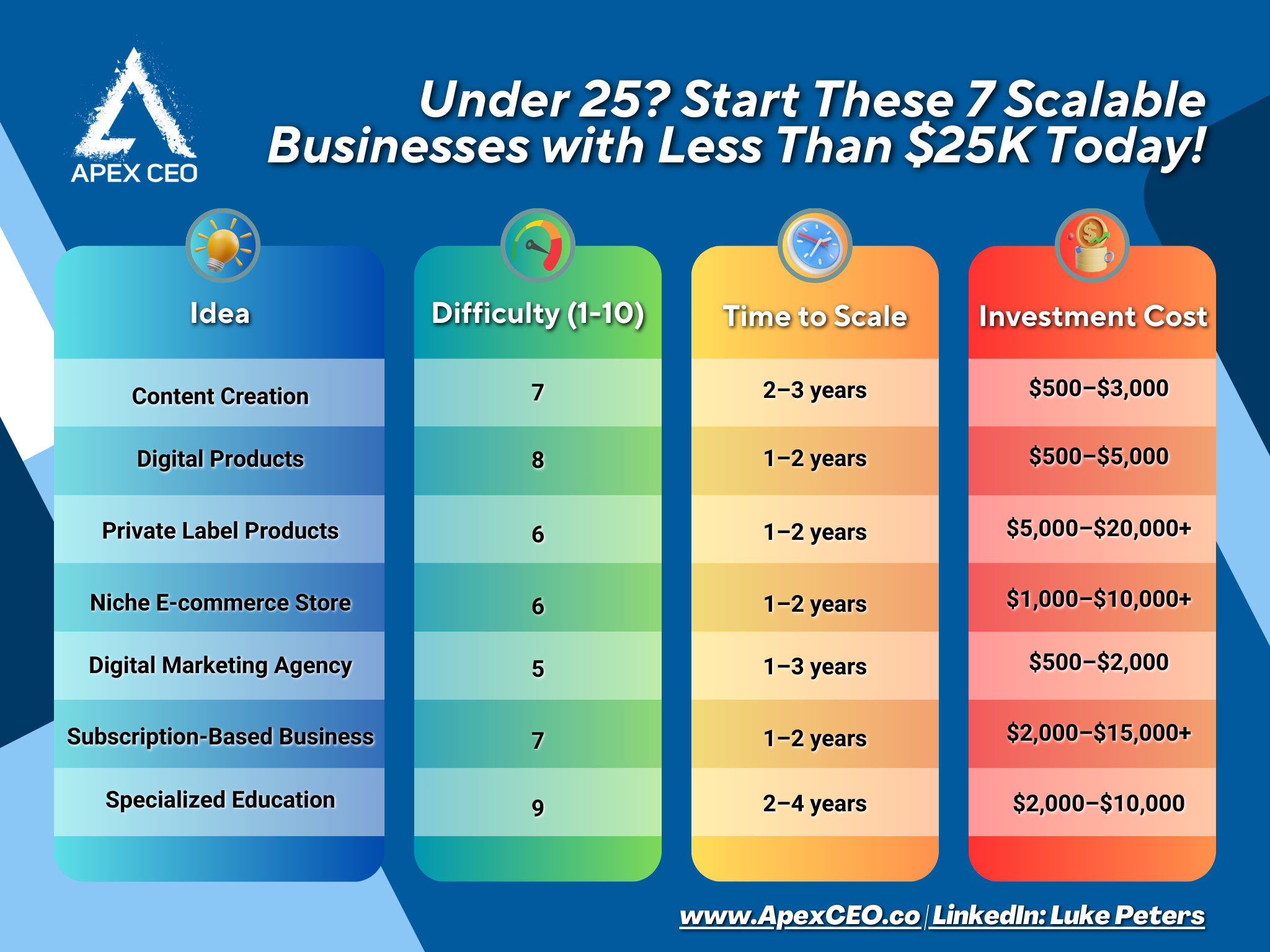If you’re serious about building a business that can grow without you working 80-hour weeks forever, scalability matters.
Here are seven proven models—what they are, how to start, and what to avoid.
1. Content Creation (YouTube, TikTok, Instagram)
Example: MrBeast turned simple videos into a multi-million-dollar brand.
Steps to Start:
-
Pick a niche you’re passionate about—fitness, travel, business, or something unique.
-
Get a camera, mic, and editing tools. You don’t need top-tier gear to start.
-
Post consistently, focus on adding value, and engage daily with your audience.
Pro Tip: Authenticity wins. Trends fade—community lasts.
Investment: $500–$3,000
2. Digital Products (E-books, Online Courses)
Example: Ali Abdaal generates passive income from online courses.
Steps to Start:
-
Identify a skill you can teach better than most.
-
Start with an e-book or small course before scaling.
-
Sell through Teachable, Gumroad, or your own site.
Pro Tip: Great products don’t sell themselves—build an email list and market consistently.
Investment: $500–$5,000
3. Private Label Products
Example: I built my business designing and selling private-label products—a proven scaling model.
Steps to Start:
-
Research high-demand niches with room for innovation (eco-friendly products, for example).
-
Find a reliable manufacturer via Alibaba or ThomasNet.
-
Build a unique brand to stand out.
Insight: Start small with one product, perfect it, then expand.
Investment: $5,000–$20,000+
4. Niche E-Commerce Store
Example: Gymshark started small and scaled into a billion-dollar brand.
Steps to Start:
-
Pick a niche with loyal customers—like sustainable gear or specialty pet products.
-
Build your store on Shopify. Keep it simple.
-
Use targeted ads and email marketing to drive sales.
Pro Tip: Retention is everything—delight customers so they return.
Investment: $1,000–$10,000+
5. Digital Marketing Agency
Example: Many agencies start solo and scale into full teams serving major brands.
Steps to Start:
-
Learn a high-value skill (SEO, Google Ads, or social media strategy).
-
Build a portfolio with small business clients.
-
Use LinkedIn to find leads.
Challenge: Avoid being a generalist—specialize early for faster growth.
Investment: $500–$2,000
6. Subscription-Based Business
Example: BarkBox and Dollar Shave Club scaled through recurring revenue.
Steps to Start:
-
Pick a niche with repeat demand (meal kits, book clubs, wellness boxes).
-
Make your offer personal and unique.
-
Use platforms like Cratejoy or Bold Subscriptions to manage it.
Insight: Growth can be slow at first—start lean and reinvest profits.
Investment: $2,000–$15,000+
7. Specialized Education Platform
Example: Duolingo scaled by solving a specific problem—language learning.
Steps to Start:
-
Teach a niche skill you’re passionate about (coding, design, leadership).
-
Create polished course content and host on Thinkific or similar platforms.
-
Use free content to attract and convert leads.
Challenge: Building authority takes time—play the long game.
Investment: $2,000–$10,000
What to Avoid
Some ideas are fine for quick cash but don’t scale well:
-
Freelance services
-
Dropshipping
-
Handmade crafts
-
Pet sitting
If your business stops when you stop working, it’s not scalable.
Final Word
If you’re under 25, this is your window. Use your energy and creativity to start small—but choose a model that can grow without you doing every task forever.
Your next step: Pick one idea, set a 90-day goal, and start building.

